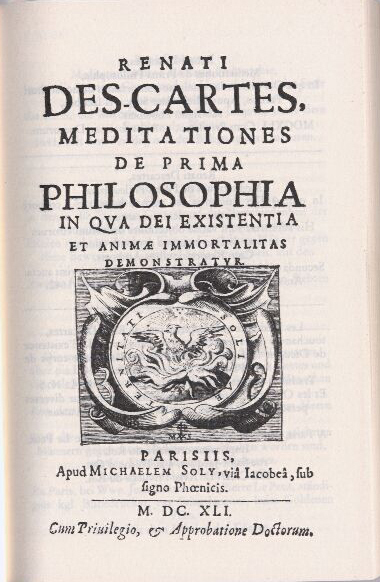Rene
Descartes - in a strong sense - attempted to erase the external world (as well as all which had come from it) from his mind as he carried out his Cogito.
Shouldn't
that “reduction” have
included the very language he used during his famous meditations?
Of
course Descartes did reject all the explicitly philosophical parts of
his language. Though he didn’t reject those parts of the language which weren't deemed to be obviously philosophical or contentious.
Thus
Descartes might have rejected this statement (even if
only to accept it later):
“The
world as a whole has a purpose.”
Though
he didn’t do the same with the seemingly non-philosophical content
of
“I
think. Therefore I am.”
The
Cogito expresses a philosophical position on the existence of the
self/I. However, Descartes expressed this axiomatic statement/inference
with public words which Descartes himself would have used for many
decades. Would Descartes have been able to explain not only the
blatant and obvious philosophical content of his famous claim: would
he also have been able to justify and explain the seemingly
non-philosophical parts of that statement?
For
example, what did Descartes mean by the word “I”? What did he
mean by “think”? Could he have justified and explained the use of
the word “therefore”? What does “am” mean? And what about the Cogito inference itself?
Of course after the Cogito Descartes could have easily explained and justified his use of the words in that statement.
Of course after the Cogito Descartes could have easily explained and justified his use of the words in that statement.
For
example, Possible Descartes might have said the following:
The
I is the essence of the mind. The part of the mind that remains
throughout its many changes.
Or:
I
use the word “therefore” between a statement and another
statement that's entailed or implied by it.
These
are explanations of Possible Descartes' use of concepts and words.
Thus perhaps he should have started his meditations with claims of a different type altogether.
For
example, meditations on the nature of the mind, thought, the self, or even
existence itself. Then Possible Descartes might have offered the following as an
alternative Cogito:
Thoughts
are processes which occur in my mind.
That's very
simple; if not very helpful. However, unlike the other Cartesian examples,
this is a statement of what is the case, not a description of the
concepts and words one uses to make Cogito-like statements. It can be seen as foundational (or even axiomatic) because surely we can't think or
philosophise at all without knowing what thoughts are. (In fact we
can.) The Cogito is a thought and an inference. Therefore it can be said to depend on
prior knowledge of what thoughts are. There would be no Cogito
without thought. Therefore thought itself is more foundational than
the Cogito inference; which is a token of the type THOUGHT.
Possible
Descartes might have then said:
Thoughts
are processes which occur in my mind.
From
this, Possible Descartes might have wanted to derive numerous other
statements which were somehow entailed or implied by it.
In
this statement too there are concepts and words which haven't been
explained or possibly even understood. That is, what does Possible Descartes
mean by “mind”? What is a “process”? Are processes in the
mind the same as physical processes external to the mind? And so on.
Not
only are there presupposed concepts in this statement: we also need
to think in terms of how each concept is intimately connected to
other concepts.
If concepts
aren't atomic; then perhaps they depend on other concepts for part of
their content. Thus even if the concepts SUBSTANCE, Descartes' own
THINKING THING, and THINGS WHICH FOLLOW ONE ANOTHER aren’t in the
statement itself, the concepts THOUGHT, PROCESS and MIND (which are
in the statement) rely and depend upon the existence of other
concepts and our knowledge and acceptance of of them. As Jacques Derrida said
(in an extreme holistic manner):
“Every
borrowing of a concept from western philosophy bring along with it
the whole of western philosophy. Concepts are not atoms, they are
part of a syntax and a system.”
How
could Descartes have used common words to refer to an essentially
private domain? Descartes shouldn't have even used common words to
talk to himself about an ostensibly private domain (or use them as
vehicles of self-attribution).
And it is here that we enter the territory of the "late Wittgenstein".







No comments:
Post a Comment